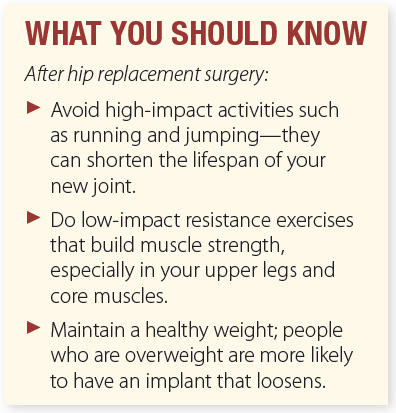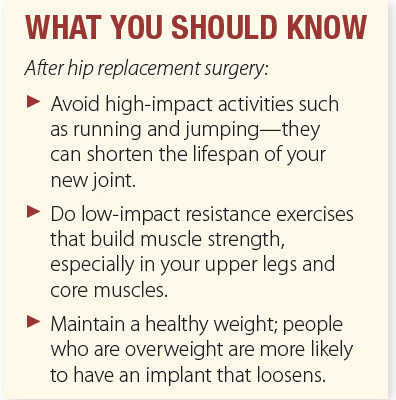Patient Participation Is a Must for Optimum Hip Replacement Outcome
More than 350,000 hip replacement surgeries are performed each year in the U.S. And the number of procedures per year will continue to rise, in part due to the growing numbers of baby boomers who are willing to undergo surgery rather than live with the pain and decreased mobility arthritis can bring. Also, an increasing number of younger patients between the ages of 45 and 54 are choosing to have hip surgery.
Due to medical advancements, a total hip replacement (THR) is less risky than it once was. However, it is still a major medical procedure, and patients who are thoroughly informed and prepared are more likely to have the best outcomes as well as an easier time prior to, during, and after the surgery.
A Shorter Stay in the Hospital
In THR, a diseased or damaged hip joint is removed and replaced with an artificial joint, which consists of a ball and socket made of plastic, ceramic, and/or metal. The most common reason for THR is osteoarthritis in the hip joint. In the joint, the protective cartilage that cushions the ends of your bones wears down until, eventually, you have bone rubbing on bone, which causes pain and limits mobility.
Like many surgical procedures, THR has benefited from technological advances that have reduced the length of post-surgical hospital stays as well as the time it takes to get back on your feet.
“After THR surgery, many patients are up and walking that same day, and most patients are in the hospital for only three or four days,” says Jill Rieger, MD, an internist at Weill Cornell Medicine.

Patient Participation Is a Must
The surgeon is only partially responsible for the procedure’s outcome: The patient can have a significant impact on the success of the surgery, as well as the post-surgical rehab process.
Be sure to provide your surgeon with any information that may impact your surgery, including a list of all of the medications (prescription and over-the-counter) and supplements you take.
“Some medications, including hormone therapy, can increase the risk of blood clots,” Dr. Rieger explains.
Anticoagulant drugs that prevent blood clots will increase your risk of bleeding, and most patients have to stop taking these medications for several days before surgery.
After surgery, make sure to follow all of the directions your doctor gives you. If you have any warning signs that there might be a problem with your prosthesis, such as sudden pain, decreased range of motion, or difficulty walking, report them to your doctor immediately. And be prepared for at least three months of physical therapy two to three times a week, which is necessary for a successful rehabilitation.
“Participate fully in physical therapy. You’ll have to do a little bit of hard work, but it will pay off,” says Dr. Rieger.
Preparation Is Key
Many factors affect the success of THR and the speed of recovery.

“Prior to surgery, optimize your weight and overall health for the quickest, easiest recovery. You can do ‘prehabilitation’ before surgery,” advises Dr. Rieger. “Also, be sure you have a good understanding of what will occur before, during, and after surgery so you will have realistic expectations.” She recommends the following:
- Stay as active as possible before surgery.
- If you’re overweight, lose some of those extra pounds; it will make the rehabilitation process easier.
- Make sure your dental care is up to date; you can’t have dental procedures for a few months following surgery due to the possibility of infection.
- If you are returning home after surgery, get any adaptive equipment you’ll need, such as a walker, raised toilet seat, and shower bench, before surgery.
- Call on family and friends for assistance with transportation, grocery shopping, food preparation, and other domestic tasks following surgery.
Many factors can affect the outcome of your hip replacement; your involvement in the process from start to finish will have a significant effect on your overall result.
The post Patient Participation Is a Must for Optimum Hip Replacement Outcome appeared first on University Health News.
Read Original Article: Patient Participation Is a Must for Optimum Hip Replacement Outcome »


